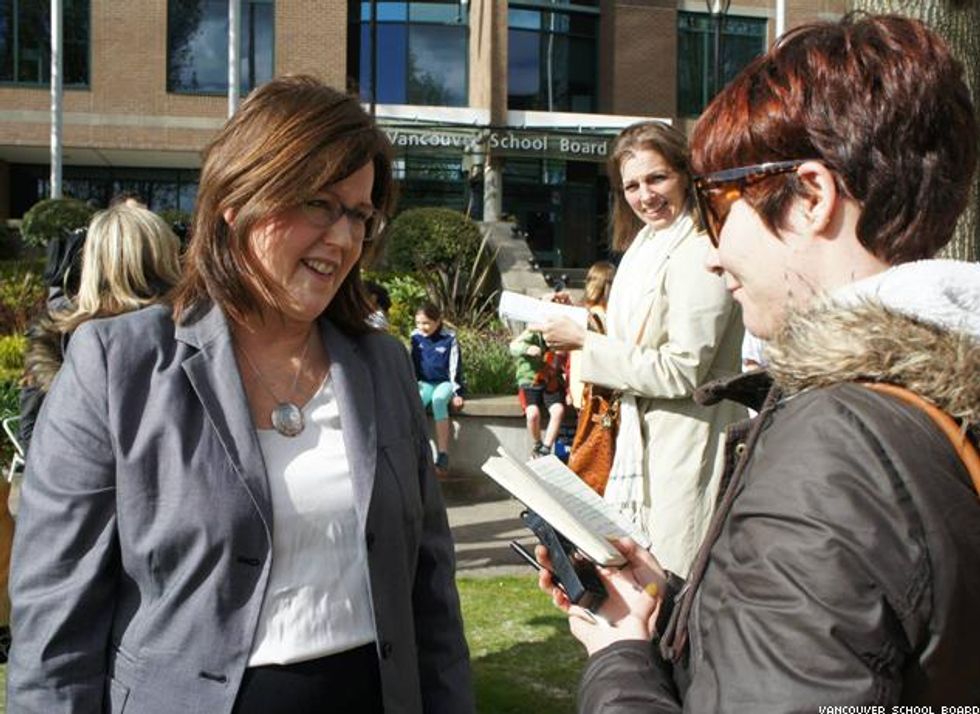Vancouver's school board amended its decade-old policy on transgender students earlier this month, by adopting what is possibly the most trans-inclusive policy passed by any school board in the U.S. or Canada.
In a section titled "Gender Identity and Gender Expression," the policy states that a transgender student's status and birth sex must be kept confidential unless legally required. It also mandates that transgender students be addressed by their preferred names and pronouns, that student records be changed to reflect preferred gender, and that students must have access to the bathroom that matches their preferred gender. The Vancouver school board even examined desegregating all previously single-sex activities.
"The intent of the revisions were to look at this policy that's been in place for 10 years, and to really codify how we support our students who were transgender," said Vancouver School Board chair Patti Bacchus in an interview with The Advocate.
The most controversial aspect of the new policy is its commitment to keeping the transgender status of students confidential. The policy mandates, "Unless the student or the student's parent/guardian has specified otherwise, communications between school and home shall use a student's legal name and the pronoun corresponding to the student's gender assigned at birth."
The new policy sparked uproar among a group of Vancouver-area parents, particularly among those of Chinese descent.
"We did not send our children to public schools to be indoctrinated with the teacher's ideology," parent Cheryl Chang told the South China Morning Post. "Parents are primary caregivers and they need to be involved in decisions about what their children are being told and how they are acting out."
Bacchus said she was surprised by the ferocity of protest against the new policy: "Some of the parents have a lot of fear and misunderstanding about what this policy means. I haven't heard a single young person object to this. It's a generational misunderstanding."

Above: Vancouver School Board chair Patti Bacchus
While some parents merely raised concerns over possible limits the policy would place on teacher-parent communications, two school trustees took their opposition further. The trustees held a press conference at which they claimed local real estate agents were complaining that the school board's new gender identity policy would lower property values. Several agents told the Vancouver Sun they hadn't even heard about the issue until reporters began calling them after the press conference.
When the trustees refused to name the real estate sources supposedly backing their claim, they were promptly fired.
Bacchus told The Advocate that the updated LGBT student policy was endorsed by the school board's parent advisory council, the student council, and the board's health directors.
Statistics show that supporting transgender youth in school environments, as well as gay, lesbian, and bisexual youth, is vital to lowering rates of suicide and violence.
According to a widely cited U.S. study by the National Gay and Lesbian Task Force, 78 percent of those who show gender-nonconforming appearance and/or transgender identity in school report being harassed. Thirty-five percent also report being physically assaulted, and 31 percent report being harassed by teachers and staff.
The study found that those who were physically assaulted at school because of gender identity or expression were twice as likely to do sex work and 50 percent more likely to be incarcerated. In addition, 64 percent of those students reported attempting suicide.
Shayne Ivany, PFLAG Canada's operations coordinator, said the confidentiality clause in the new policy is about keeping kids safe, not arbitrarily shutting parents out.
"It's very unsafe for schools to contact a parent without the child saying that it's OK," Ivany said. "They can be kicked out of their homes, thrown out of their families. Most of the time it's for the student's home safety that we not contact parents."
Ivany said that statistics on Canada's transgender youth were hard to come by, since "the Canadian government doesn't keep track of that," but said that anecdotal evidence through calls to PFLAG supported the rates found by the Task Force study.
In the U.S., life for transgender youth may be improving after the U.S. Department of Education's Office for Civil Rights issued new guidance this April that protects transgender students from discrimination on the basis of sex under Title IX. Specifically, the guidance states, "Title IX's sex discrimination prohibition extends to claims of discrimination based on gender identity or failure to conform to stereotypical notions of masculinity or femininity and OCR accepts such complaints for investigation."
Some states, such as Oregon, have passed versions of the Safe Schools Act, which has repeatedly failed in the U.S. Senate.
Forty-nine states have some kind of safe schools legislation on the books, but very few states that have really rock solid policy, said Neola Young, safe schools and training institute manager for Q Center in Portland. Q Center is currently in the process of auditing all 197 of Oregon's school districts regarding their policies on LGBT students.
Regarding Vancouver's new policy, Young said it "goes above and beyond" what she's seen anywhere else.
"In the U.S., the only thing that's slightly comparable was the law in California, the School Success and Opportunity Act," Young said. "It restates allowance in bathrooms and things like that."
The School Success and Opportunity Act, which prevents discrimination against transgender students as well as preventing discrimination on the basis of sex for all students, passed in California in August 2013. Since then, opposition groups have made several attempts to repeal the law.
"I would love to see all of our school districts have policies like this," Young said. "People ask why do we have to have special policies for trans students? And the answer is, because they're leaving school, they're dying, and we need to address that."
Bacchus told The Advocate that when her school board announced its new policy, she was contacted by a transgender student who said they had dropped out of school. The new policy, said Bacchus, gave the student courage to plan to return to school this fall.
"We want everyone to feel like they are welcome at school and to feel proud of who they are," Bacchus said, "It's a small group of people, but some who have really suffered. There's nothing more tragic to me than youth suicide, and if we can lessen that at all, it's a big deal."
MARY EMILY O'HARA is a freelance journalist living in Brooklyn, N.Y. She is a regular contributor to VICE News, covering human rights, the drug war, and domestic news. Follow her stories on Twitter: @maryemilyohara.



















































































Viral post saying Republicans 'have two daddies now' has MAGA hot and bothered